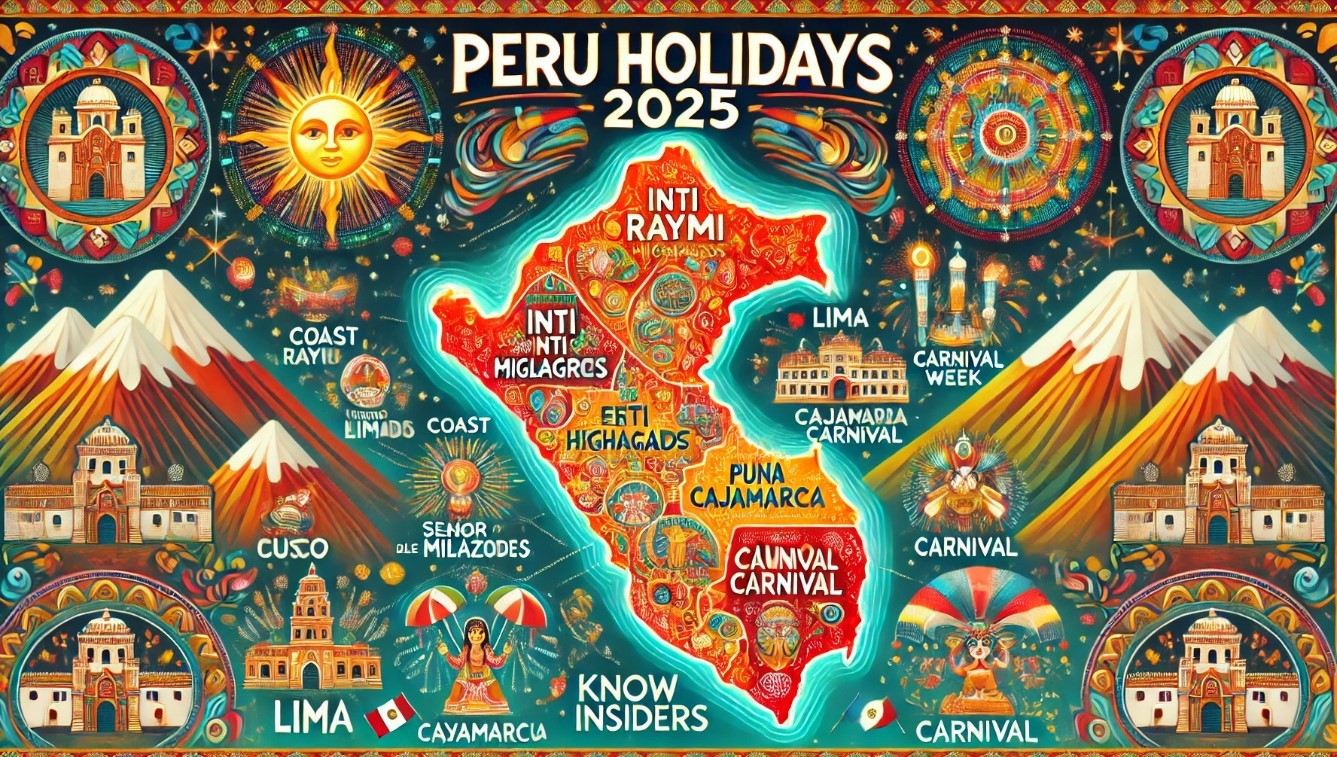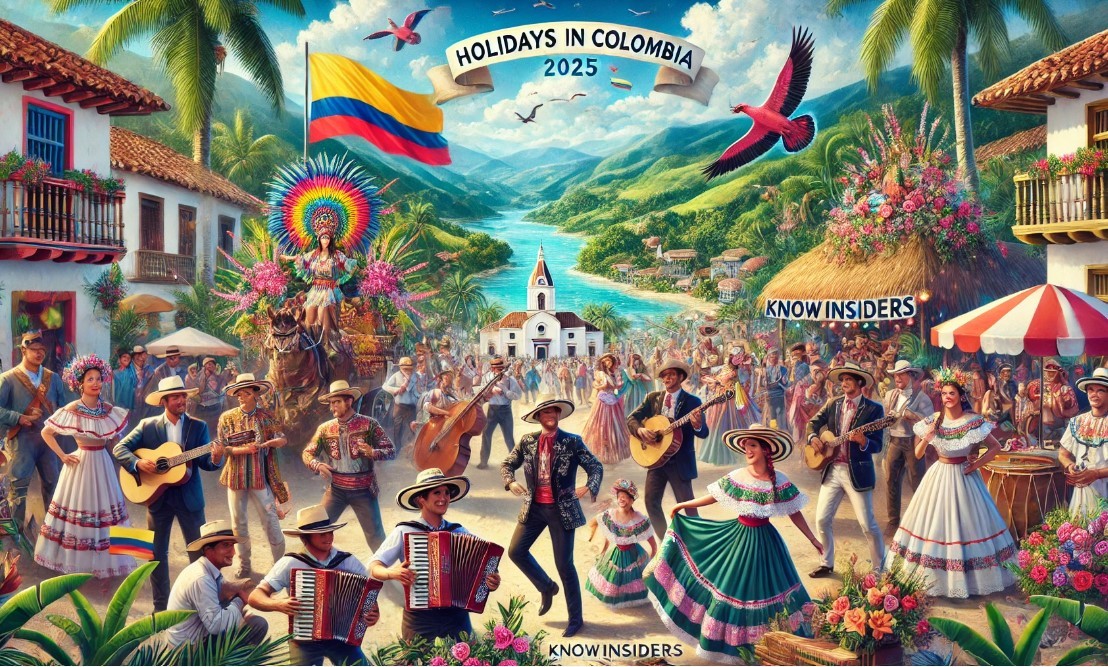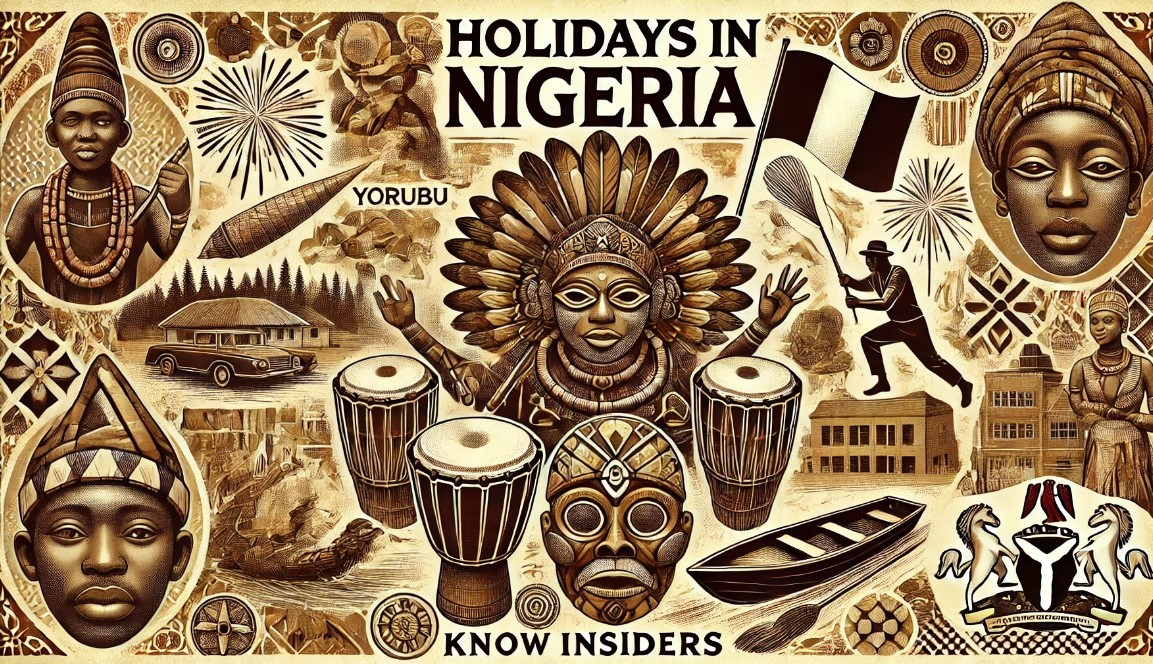2025 Philippines Calendar - Full List of Public Holidays And Observances: Dates & Celebrations
 The Full List of Billionaires Of Philippines - Who Are The Richest Person In The Philippines? The Full List of Billionaires Of Philippines - Who Are The Richest Person In The Philippines? |
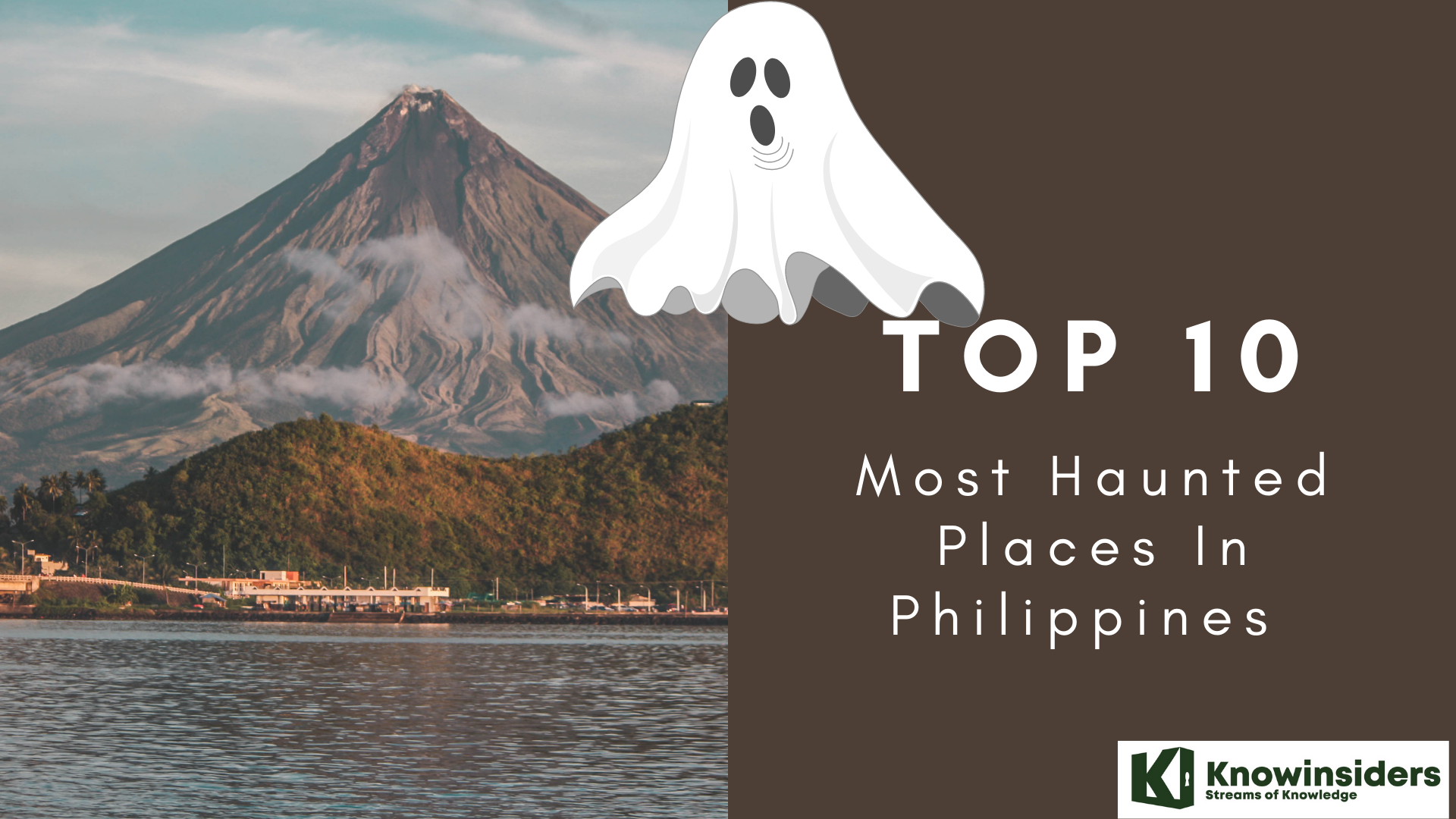 Top 10 Most Haunted & Ghostly Destinations in Philippines Top 10 Most Haunted & Ghostly Destinations in Philippines |
An Overview of Philippines and Holidays
There are about 7,641 islands that make up the Philippines. They are on the Pacific Ring of Fire in Southeast Asia. It is common for earthquakes and typhoons to happen in this part of the Philippines. People of a lot of different races and cultures live on the Philippines Islands. Negritos and Austroesian people were some of the first people to live there. In later years, people from Malaysia, India, Arab countries, and China all moved to the islands.
Ferdinand Magellan found the islands in 1521, and the Spanish started to settle there right away. The islands were named for King Philip II of Spain in 1543. They were part of the Spanish Empire for more than 300 years. The Philippines became the Republic of the Philippines on July 4, 1946.
There are three types of holidays in the Philippines:
Regular holidays
 |
| Regular holidays in Philippines |
From the word "regular," you can tell that Filipino holidays always happen on the same day. Because Christmas Day and New Year's Day are the same in the US, you don't have to think about it too much.
There are some fun extras, though. For example, the Philippines has religious and historical holidays that we'll talk about next.
A lot like US holidays, your workers are entitled to the minimum wage rate. In other words, they'll get paid for the whole day even if they didn't show up.
Also, the law says that Filipinos should get 200% of their regular pay if they come to work on a regular holiday.
Special non-working holidays
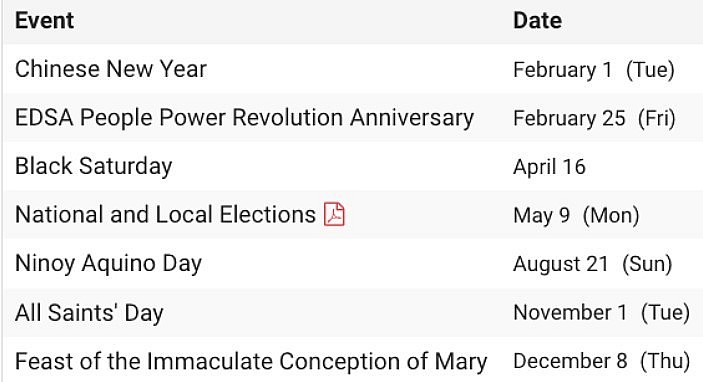 |
| Special non-working holidays |
A lot of different cultures live together in the Philippines. It makes perfect sense to have other holidays that honor religions and events that aren't important to most people.
These kinds of events fall under special non-working holidays:
• Chinese New Year
• Election Day —
• — and even the People Power Revolution Anniversary.
It's important to remember that these holidays are all "no work, no pay" days in this country. Most Filipinos who ask for time off here know they won't get paid while they're away. These are usually days off that they use to rest at home, do chores, or take a break from work.
But if they did come to work, they would get paid their regular salary plus 30% of their daily wage.
Special working holidays
There are only three special working holidays in the Philippines:
• All Souls’ Day (November 2)
• Christmas Eve (December 24) —
• — and New Year’s Eve (December 31).
You can probably tell that these aren't like other work days because they fall on or before important religious holidays. Some offices are still open to finish up some last-minute tasks before they close for good.
Filipinos are only entitled to their basic pay if they choose to work on special working holidays, which are treated like any other work day.
Most Popular Holidays and Observances in Philippines 2025
There are both public holidays and observances in the Philippines on this list of the most popular holidays. Observances are traditional celebrations and events that are popular in a country but don't count as days off from work. Public holidays are special days that everyone gets off work. As official changes are made, some of the dates above may be changed, so please check back often for the latest information.
1 Jan New Year's Day
27 Jan Lailatul Isra Wal Mi Raj
29 Jan Lunar New Year's Day
25 Feb People Power Anniversary
1 Mar Ramadan Start
31 Mar Eidul-Fitar
9 Apr The Day of Valor
17 Apr Maundy Thursday
18 Apr Good Friday
19 Apr Black Saturday
20 Apr Easter Sunday
1 May Labor Day
7 Jun Eid al-Adha (Feast of the Sacrifice)
8 Jun Eid al-Adha Day 2
12 Jun Independence Day
27 Jun Amun Jadid
21 Aug Ninoy Aquino Day
25 Aug National Heroes Day
5 Sep Maulid un-Nabi
1 Nov All Saints' Day
2 Nov All Souls' Day
30 Nov Bonifacio Day
8 Dec Feast of the Immaculate Conception
24 Dec Christmas Eve
25 Dec Christmas Day
30 Dec Rizal Day
31 Dec New Year's Eve
A Complete List of Public National/Regional Holidays And Observances: Dates & Celebrations in Philippines 2025
1 Jan Wednesday - New Year's Day Regular Holiday
In the Philippines, many people think of New Year's Day as an important holiday. In many places, like the Philippines, the Gregorian calendar is used, and this marks the beginning of a new year.
On January 1, the Philippines celebrates New Year's Day as a public holiday. Most stores, schools, and government buildings are closed. On New Year's Day, there are fewer bus and jeep services available for public transportation.
How to Celebrate:
There is a meal called Media Noche that many Filipinos get together to eat on December 31, which is New Year's Eve. A lot of people also stay up late to welcome the New Year. People in the Philippines also light fireworks and make a lot of noise on New Year's Day to scare away evil spirits. The Chinese are the ones who first believed this.
Kids are told to jump at midnight by older people so that they will grow up tall. A lot of people wear clothes with polka dots and display 12 round fruits to represent money. Many people also believe that opening all the doors and windows at midnight will bring good luck. A lot of Filipino families read the Bible and go to midnight mass at church. A lot of Filipinos celebrate New Year's Day with a mix of religion and superstition.
23 Jan Thursday - First Philippine Republic Day Special Working Day
On the first Philippine Republic Day, there is no public holiday. Businesses are open at regular times.
When the President or Congress declares a special working holiday, it is treated like any other business day.
27 Jan Monday - Lailatul Isra Wal Mi Raj (Tentative Date) Common local holiday
Today is Isra and Mi'raj, which is also written as Al Isra' wal Miraj. It is the 27th day of Rajab, which is the seventh month in the Islamic calendar. This event marks the night that Mohammad (also called Mohamed or Muhammed) was taken by Allah (God) from Mecca to Jerusalem and then to heaven.
It is a public holiday on Lailatul Isra Wal Mi Raj. People in general have the day off, and most schools and businesses are closed.
29 Jan Wednesday - Lunar New Year's Day Special Non-working Holiday
In many East Asian countries, like the Philippines, Lunar New Year is a public holiday.
In China, the Lunar Year starts at sunset on December 21, which is the second New Moon after the winter solstice. So, the New Year can start at any time between January 21 and February 21.
All businesses in the Philippines are open during Lunar New Year because it is not a public holiday. Some streets may be closed in some China Towns in different cities, though, to honor this holiday.
How to Celebrate:
Filipino-Chinese communities in the Philippines celebrate the Lunar New Year every year in the hopes of getting rich, getting closer to family, and finding peace. It is believed that putting lucky money in red envelopes, serving sweet foods, and putting different kinds of food and fruits on a table will bring good luck to Filipino-Chinese families. In different cities in the Philippines, China Towns hold parades and dragon dances that people can take part in.
24 Feb Tuesday - Cebu City Charter Day
A special holiday in Cebu where no one works to honor the founding of Cebu City.
In honor of the anniversary of its founding, February 24 is a special holiday in the City of Cebu that no one works. It is called Cebu City Charter Day.
Republic Act 7287 made this holiday a legal holiday in March 1992.
The City of Cebu was created by Commonwealth Act No. 58 on February 24, 1937. It was called "Cebu City" when the Municipality of Cebu, which was part of the Cebu Provincial Government at the time, became its own Chartered City.
The municipality of Cebu, which was part of the Cebu Provincial Government at the time, became a Chartered City and was named "Cebu City." It was the third city in the Philippines, after Manila in 1571 and Baguio in 1909.
25 Feb Tuesday - EDSA People Power Anniversary Special Non-working Holiday
Every year on February 25, the Philippines marks the anniversary of the EDSA People Power Revolution. Many people took to the streets peacefully in 1986, which led to the removal of President Ferdinand Marcos's corrupt rule.
To honor the EDSA People Power Revolution, the Philippines has taken the day off from school every year since 2010. In this case, both public and private schools are closed, but stores are still open. Every year on February 25, there was a holiday from work. This year, the Monday closest to that date is a holiday for schools only.
How to Celebrate:
Today is the anniversary of the EDSA People Power Revolution, which is known as "the revolution that shocked the world" and marks the return of democracy to the Philippines. Up until now, the name Marcos has always been linked to corruption, even though there have been attempts to change the past.
A lot of people remember the events of the People Power Revolution in 1986 by gathering in EDSA in yellow and going to concerts and church services in the area. "LABAN," which means "fight," is the name of the political party that led the revolution, and people in EDSA hold their hands up in an L-shape to protest. Every year, the event gets a lot of attention from TV and other media. There are a lot of documentaries about 1986 and other patriotic shows.
16 Marr - Davao City Day
Metro Davao, which is in the Philippines, has a special day off every year on March 16 called "Davao City Day."
Today is the anniversary of the city's incorporation, which took place on this day in 1936. It is also known as Charter Day and Araw ng Dabaw.
The Spanish built Davao on the island of Mindanao on June 29, 1848. It is in the Davao Gulf. While the United States was in charge, Davao began to grow and spread.
On March 16, 1936, Congressman Romualdo Quimpo from Davao filed Bill 609, which was later signed into law as Commonwealth Act 51. It turned the town of Davao and the municipal district of Guianga into the City of Davao.
During the Second World War, the Japanese took over the city. After the war, the city had to be rebuilt from the ground up.
How to Celebrate:
Today, Davao City has more people than any other city in the Philippines, except for Quezon City and Manila. It is also one of the biggest cities in the world in terms of land area.
On Araw ng Davao, people celebrate the birthday of this multicultural city by holding a number of events all over the metropolitan area. There are trade fairs and cultural shows every day for seven days as part of the celebrations. A colorful parade of civilians and soldiers and a beauty pageant for the whole city are also planned.
1 Mar Saturday - Ramadan Start (Tentative Date) Observance
 |
| The month of Ramadan begins when the Waxing Crescent Moon can be observed in the evening sky. |
In Islam, Ramadan is the ninth month of the year. It is also written as Ramadhan or Ramzan. This is the time of year when Muslims all over the world focus on religious devotion, prayer, fasting, and giving to charity. The last third of Ramadan is a very holy time because it marks the anniversary of when the first verses of the Koran (Qu'ran) were revealed to the Prophet Muhammad (Mohammad or Muhammed).
Saturday, March 1, 2025, is Ramadan Start, but it is also a work day. In the Philippines, most businesses have set hours.
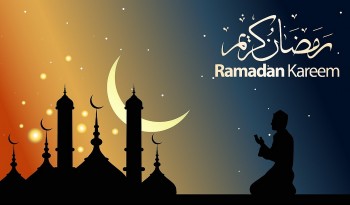 Happy Ramadan: Top 25 Most Popular Words/Phrases and Pronunciation in Arabic, English Happy Ramadan: Top 25 Most Popular Words/Phrases and Pronunciation in Arabic, English |
20 Mar Thursday - March Equinox Season
The March equinox is when the Sun moves from south to north across the celestial equator, which is a made-up line in the sky above Earth's equator. Every year, this takes place on March 19, 20, or 21.
31 Mar Monday - Eidul-Fitar (Tentative Date) Regular Holiday
About 6% of the people in the Philippines are Muslim. To honor the country's Islamic history, Republic Act 9177 and Presidential Proclamation 1083 made Eid'l Fitr a regular holiday in 2002. These laws were signed into law in November 2002 while Arroyo was president.
How to Celebrate:
"Festival of Breaking the Fast" is another name for Eid al-Fitr. As part of Islam's five pillars, people fast from dawn until dusk during the holy month of Ramadan (also called Sawm). Muslims think that the text of the Qur'an was shown to the Prophet Muhammad during the month of Ramadan.
Eidul Fitr is the end of Ramadan for Muslims in the Philippines. It is against the rules to fast on this day because it is a holiday. Before going to a community event, which is usually held in a mosque, Muslim Filipinos wash their hands in a special way and say special prayers to Allah. For this reason, they give the required charity of food on this day, which is called "zakat al-fitr," and they listen to special sermons for the event. Many families choose to celebrate with a feast with their extended family and friends after this event.
9 Apr Wednesday - The Day of Valor Regular Holiday
In the Philippines, April 9 is a public holiday called "Day of Valor" to remember when the Bataan peninsula fell in World War II.
This official national holiday is celebrated every year on April 9th. In Filipino, it is called "Araw ng Kagitingan."
If the date falls on an Easter holiday, it might be moved, like it was in 2009.
It might also be called "Bataan Day" or "Bataan and Corregidor Day." It's a memorial to the ending of the Battle of Bataan in World War II.
How to Celebrate:
On this day, veterans of the Second World War will hold parades in many cities in the Philippines. The main event takes place at the Mt. Samat Shrine (shown above) in Bataan, which honors the bravery and sacrifice of American and Filipino soldiers in World War II. This is a speech by the president of the Philippines to honor veterans.
April 9 was named Bataan Day in 1961. It was officially changed to "Araw Ng Kagitingan" (Day of Valor) in 1987 to honor the people who fought for Bataan, Corregidor, and Bessang. The holiday used to be celebrated on the Monday before April 9th, but since 2009, a presidential decree has made it official that it is celebrated on April 9th.
Since it is a legal holiday across the whole country, employers should follow the rules for holiday pay.
17 Apr Thursday - Maundy Thursday Regular Holiday
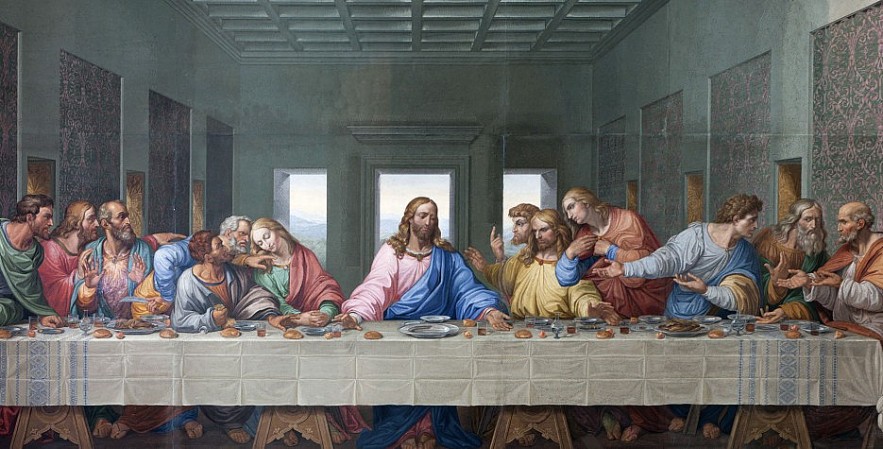 |
| Maundy Thursday in Philippines |
Maundy Thursday, which is also called Holy Thursday or Good Thursday, has been a holiday since the beginning of the Christian Church.
From Maundy Thursday to Black Saturday, which is part of the Easter Triduum, which is a religious celebration that lasts three days, the Philippines has a legal holiday. Most radio and TV stations in the country usually shut down. Businesses and trade are closed.
Filipino workers take a half-day off on Holy Wednesday to observe the solemn days leading up to Easter, which is the holiest day in the Christian calendar and even more important than Christmas.
How to Celebrate:
Maundy Thursday is the occasion preceding the cross-crucification of Jesus Christ. Apart from fasting, most Filipinos avoid engaging in activities including drinking alcohol, consuming meat, and having sex with their spouses. The re-enactment of the Last Supper, arranged by churches, highlights Maundy Thursday On this specific day, Filipinos usually pay visits to seven churches. Visita Iglesia is a Spanish term meaning "to visit churches." To represent the fourteen stations of the cross, some people travel to fourteen different churches.
18 Apr Friday - Good Friday Regular Holiday
For most of the Philippines, Good Friday is a public holiday as well as a religious event. It happens two days before Sunday Easter.
Good Friday marks closure of government offices, educational institutions, most major businesses including shopping centers. Holiday spots like hotels and beaches are packed with visitors and guests. Public transportation is cut, thus people who want to travel will have to make early plans.
How to Celebrate:
In the Philippines, Good Friday is part of the religious holiday week that ends with Easter Sunday. During this time, a lot of Filipinos don't do things that are associated with the outside world, like drinking alcohol or listening to loud music. This is the day when most Catholics don't eat meat and instead fast and pray.
A lot of people also go to church and do the Stations of the Cross or the Acts of Repentance to Jesus Christ. Each Station of the Cross shows the last hours of Jesus' life, and Filipinos use them to think about how much Jesus suffered. In different parts of the Philippines, some men pretend to be Jesus Christ and do the same penance by putting themselves on the cross.
Before 3pm (or 15:00) local time, there are also masses (church services) in the church. This is done to honor the time that Jesus Christ died on the cross. As soon as the clock strikes 3 p.m. (15:00), everyone is quiet and respectful. On Good Friday, people do different kinds of penance to say sorry for their sins. During the holiday, some Filipinos go to the beach.
19 Apr Saturday Black Saturday Special Non-working Holiday
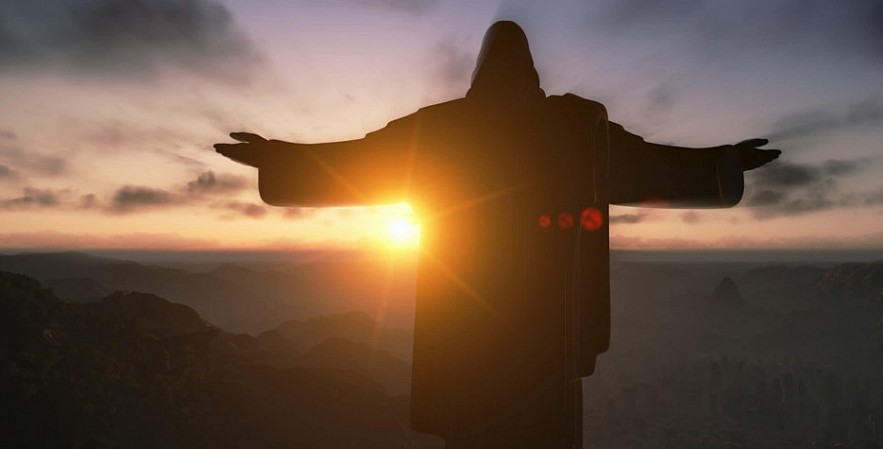 |
| Black Saturday in Philippines |
Black Saturday is a holiday. People in general have the day off, and most schools and businesses are closed.
It will be a Saturday in 2025, so some businesses may decide to work on that day.
Holy Saturday is the day after Good Friday. It's also sometimes called Black Saturday, White Saturday, Easter Eve, or the Vigil of Easter.
If you're religious, Easter Saturday is the Saturday after Easter Sunday. Keep in mind that it may also be called Easter Sunday.
In the Western church, Holy Saturday can happen any time between March 21 and April 24. It is the last day of Holy Week.
20 Apr Sunday - Easter Sunday Observance
Easter Sunday is one of the most joyous occasions for Christians worldwide. It is a celebration of the resurrection of Jesus Christ from the dead, as recorded in the Christian Bible.
Easter Sunday is not recognized as a public holiday. The event is scheduled for Sunday, April 20, 2025, and the majority of businesses in the Philippines adhere to their standard Sunday operating hours.
1 May Thursday - Labor Day Regular Holiday
People in the Philippines celebrate Labor Day every year. It is also known as Araw ng mga Manggagawa.
On May 1, people all over the world celebrate this holiday. It is most often linked to remembering the people who worked hard during the labor movement. It's also called International Worker's Day or May Day, and over 80 countries observe it as a public holiday.
In the Philippines on May 1, 1903, 100,000 workers marched through Malacañang to demand better working conditions from the government, which was led at the time by the United States.
The Philippine Assembly made the first of May a national holiday by passing a law on April 8, 1908.
An official Labor Day celebration took place on May 1, 1913, at Cine Oriente on C.M. Recto Street, which was then called Azcarraga, in Manila. It was made up of 36 unions.
7 Jun Saturday - Eid al-Adha (Feast of the Sacrifice) (Tentative Date) Regular Holiday
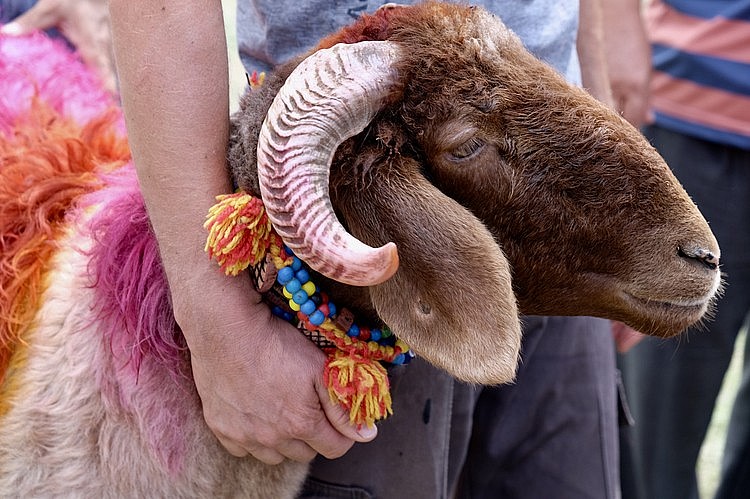 |
| Sheep are among the animals sacrificed on Eid al-Adha |
On Eid al-Adha, Muslims show their devotion to Allah by killing an animal as a sacrifice. The holiday comes from a story in the Quran that Christians and Jews also know.
It is a public holiday on Eid al-Adha, which means "Feast of the Sacrifice." People in general have the day off, and most schools and businesses are closed.
8 Jun Sunday - Eid al-Adha Day 2 (Tentative Date) Common local holiday
Eid al-Adha Day 2 is a public holiday. It is a day off for the general population, and schools and most businesses are closed.
12 Jun Thursday - Independence Day Regular Holiday
If you live in the Philippines, you can celebrate this holiday every year on June 12th. Today is the Philippines' National Day.
In the Philippines, this day is celebrated as "Day of Freedom" or "Araw ng Kasarinlan." It marks the anniversary of the Philippines' declaration of independence from Spain on June 12, 1898.
Independence Day in the Philippines is a national holiday, so the government is closed. In all schools, there are no classes at all. A lot of businesses are closed, but shopping malls are still open. Buses, passenger jeeps, and tricycles can still get people where they need to go, but their routes may be limited because streets that were used for parades are closed.
How to Celebrate:
Independence Day is a day when many people, including students, employees, and government workers, take part in parades across the country. The main event, though, is the police and military parade in Manila, which is led by the country's current president and includes a speech and a 21-gun salute. They often spend the day in parks and malls. A lot of Filipino communities in other countries also celebrate the country's Independence Day.
17 June - Eidul Adha
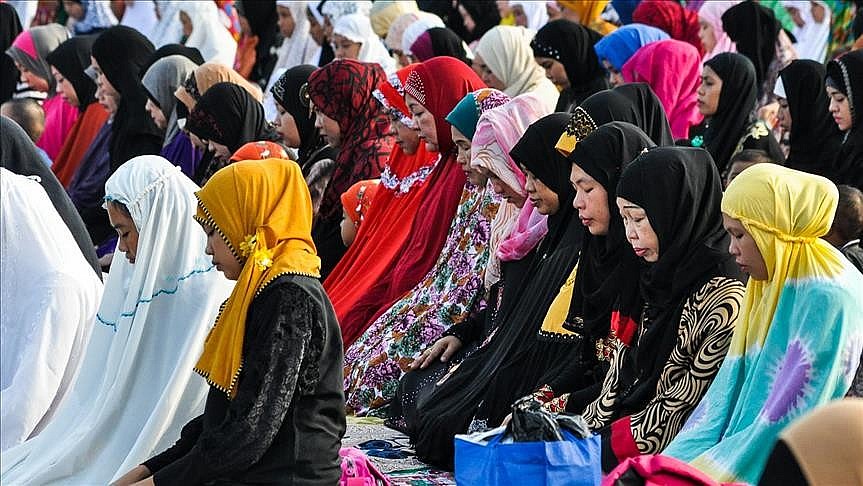 |
| Filipino Muslims celebrate Eid al-Adha |
EID Ul Adha has been a public holiday in the Philippines since 2002.
As a matter of fact, Republic Act No. 9849 makes the tenth day of Dhu al-Hijjah, which is the twelfth month of the Islamic Calendar, a national holiday to celebrate Eidul Adha.
Every year, the date is set by a proclamation that comes out about a week before the date.
This is the most important holiday in the Muslim calendar. It is also called Eid al-Adha, Eid ul Adha, Id-ul-Azha, Id-ul-Zuha, Hari Raya Haji, or Bakr-id.
Al Eid Al Kabeer, which means "Great Eid," is another name for the holiday. In religious terms, this Eid is more important because it lasts for four days instead of just one day like Eid Al Fitr, even though most countries have about the same number of public holidays for both.
Muslims believe that Ishmael was a prophet and that Muhammad is related to him.
Muslims remember how obedient Ibrahim was by killing a cow or ram on the holiday of Eid Al Adha. About a third of the meal is eaten by the family, another third is given to friends and family, and the last third is given to people who are poor and in need.
Another important part of Eid al Adha is giving money, food, or clothes to people who are homeless or poor.
21 Jun Saturday - June Solstice Season
To be in the Northern Hemisphere, the Sun must be directly above the Tropic of Cancer on June 21. It gets as far north as this latitude during the year. It starts moving south again after the solstice.
24 June - Manila Day
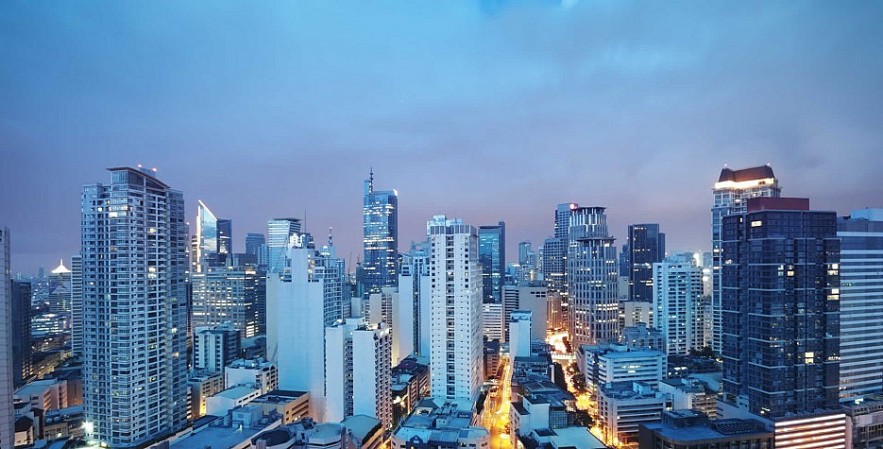 |
| Manila Day |
In Manila, the capital of the Philippines, June 24 is Manila Day, a holiday for the whole city.
Today is a holiday to remember the day in 1571 when the city was founded.
Since at least the 1300s, there has been a town called Maynilà. The name comes from the Sanskrit word for indigo because the plants used to make the dye were native to the area.
One of Spain's conquerors, Miguel López de Legazpi, built a city in his honor on June 24, 1571. People in the area called it Manila, which is strange because June 24 is St. John's Day, so the smart thing to do would have been to call it San Juan.
Manila grew during the 17th and 18th centuries because it was a key port for the Spanish Empire on the growing trade routes between the Philippines and Mexico. Its harbor was safe, and the city did well.
It wasn't all smooth sailing, though. The Chinese attacked the city in 1574, and the Dutch attacked it again in the middle of the 17th century. During the Seven Years' War in 1762, the city was taken by the British and held for a short time.
President Ferdinand Marcos made Manila the capital and seat of the national government of the Philippines on June 24, 1976.
The City of Manila is now the world's most densely populated city.
27 Jun Friday - Amun Jadid (Tentative Date) Muslim, Common local holiday
In the Islamic calendar, which is based on the moon instead of the sun, the New Year is on the first day of Muharram, which is the first month.
It is a public holiday on Amun Jadid. People in general have the day off, and most schools and businesses are closed.
It will be on a Sunday in 2024, so some businesses may decide to keep their Sunday hours.
6 Aug - Provincial Charter Day in Cebu
Every year on August 6, the Province of Cebu, which includes the very crowded cities of Cebu and Mandaue as well as the smaller cities of Lapulapu, Danao, and Toledo, has a special holiday where no one works.
Cebu is a province in the Philippines. It is in the Central Visayas region and is made up of Cebu Island and more than 150 other islands and islets that are close by.
On August 31, 2000, during the presidency of former President Joseph Ejercito Estrada, former Congressman Pablo Garcia changed Republic Act (RA) 8952, which was part of RA 7698. This made August 6th of every year a holiday on the whole island of Cebu to honor the anniversary of the province's founding.
Cebuanos have been celebrating August 6 as the founder day of their province since 1993, which is years before the law was made official. The provincial council of Cebu at the time said that King Philip II's choice of Miguel Lopez de Legazpi as governor of Cebu on August 6, 1569, "marked the foundation, albeit loosely, of a province of Cebu."
The Spanish Cortes were the first people from Europe to settle in the Philippines. They built Cebu.
19 Aug - Birthday of Manuel L Quezon in Quezon
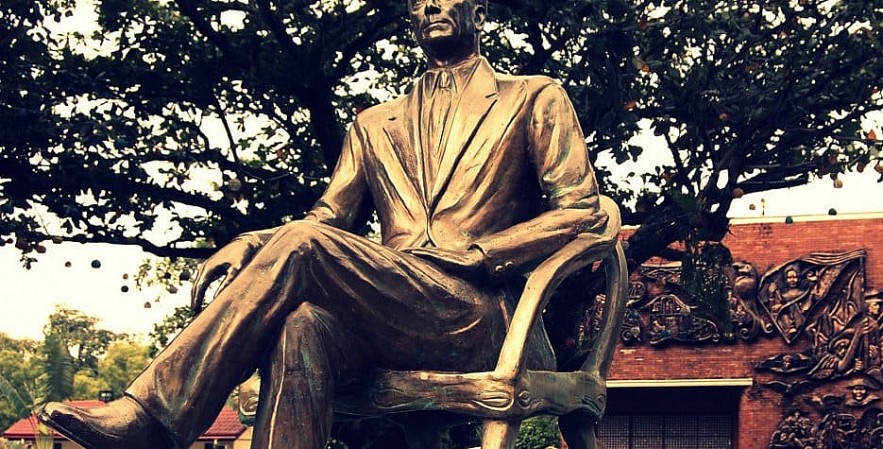 |
| Birthday of Manuel L Quezon |
On August 19, Quezon City Day, the city of Quezon and the provinces of Quezon and Aurora in the Philippines don't have to go to work.
In honor of a historical figure who gave his name to both Quezon City and Quezon Province, this holiday is held.
21 Aug Thursday - Ninoy Aquino Day Special Non-working Holiday
People can take the day off for Ninoy Aquino Day. People in general have the day off, and most schools and businesses are closed.
It is the rule that "no work, no pay" on special days and any other days that the President or Congress declares to be special.
25 Aug Monday - National Heroes Day Regular Holiday
 |
| National Heroes' Day in Philippines |
On the last Monday of August, everyone in the country celebrates this annual holiday. In the Philippines, they call it "Araw ng mga Bayani."
Today is a time to remember all the brave Filipino heroes who fought for their country's freedom, even those who went missing.
A list of important National Heroes who should be honored for their service to the Philippines was made by a committee in 1995, a year before the 100th anniversary of the revolution against Spain:
- Jose Rizal,
- Andres Bonifacio,
- Emilio Aguinaldo,
- Apolinario Mabini,
- Marcelo H. del Pilar,
- Sultan Dipatuan Kudarat,
- Juan Luna,
- Melchora Aquino
- Gabriela Silang,
Andres Bonifacio and Jose Rizal were two of these heroes who played such important roles in the fight for independence from Spain that their names are commemorated on national holidays.
The date was chosen to honor the "Cry of Pugad Lawin" in August 1896, which was the first act of rebellion against the Spanish colonizers by the Katipunan, a Filipino revolutionary movement that had been kept secret until then. People see this as the start of the revolution in the Philippines and the move toward independence.
In honor of the 100th anniversary of the revolution against Spain, 1996 was named the Year of Filipino Heroes.
An important Filipino holiday called "National Heroes Day" has been celebrated for a very long time. In fact, it started when the United States occupied the country. Act No. 3827, which was passed by the Philippine legislature on October 28, 1931, made National Heroes Day an official holiday.
In 187, when President Corazon C. Aquino was in charge, Executive Order No. 292, Book 1, Chapter 7 made National Heroes Day a regular holiday to be celebrated on the last Sunday of August. This order was part of a list of general holidays and national celebration days.
When President Gloria Macapagal-Arroyo signed Republic Act No. 9492 in 2007, it changed the date of the national holiday to the last Monday of August. Changing the holiday to Monday was part of the "holiday economics" plan, and the Arroyo administration pushed for long weekends so that people could enjoy domestic tourism.
On this day, parades and wreath-laying are held to remember those who died fighting for the Filipino nation.
It is National Heroes Day in the Philippines on the last Monday of August every year. This date was chosen because it was the first day of the Cry of Pugad Lawin in 1896, which was the start of the Philippine revolution against the Spanish colonizers.
Filipinos honor National Heroes Day by going to local events like parades, wreath-laying ceremonies at shrines, and so on. People often spend the rest of the day with family and friends in parks, shopping malls, and other public places since most people don't have to work. In some places, small fireworks shows may also happen in the evenings.
3 Sep Wednesday - Yamashita Surrender Day Special Working Day
Yamashita Surrender Day is not a public holiday. Businesses have normal opening hours.
Special working holidays are proclaimed by the President or by Congress and are considered as ordinary working days.
5 Sep Friday - Maulid un-Nabi (Tentative Date) Common local holiday
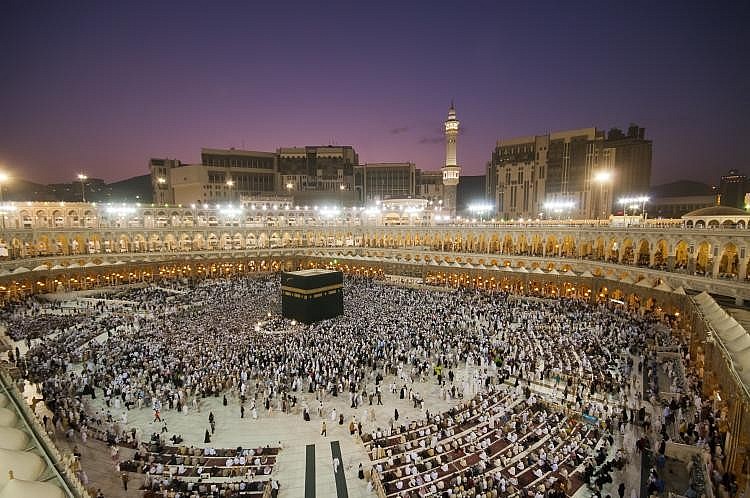 |
| The Prophet Muhammed was born in Mecca, a city in Saudi Arabia that is revered as holy by Muslims |
It is the 12th day of the Islamic month of Rabi' al-awwal, which is the birthday of the Prophet Muhammed (also called Mohammed or Muhammad). Shi'a Muslims celebrate it on the 17th of this month. People think that Muhammed is the last prophet.
It is a public holiday on Maulid un-Nabi. People in general have the day off, and most schools and businesses are closed.
8 Sep Monday - Feast of the Nativity of Mary Special Working Day
The Feast of the Nativity of Mary is not a holiday. In the Philippines, most stores are open on Sundays, so this event will happen on September 8, 2024.
When the President or Congress declares a special working holiday, it is treated like any other business day.
9 Sep - Osmeña Day in Cebu
In honor of Sergio Osmeña, Sr., who was Governor of Cebu and the 4th President of the Republic of the Philippines, September 9 is Osmeña Day, a special holiday in the province of Cebu and all of its cities.
Republic Act 6953, which was signed into law in May 1990, made it official.
Sereno Osmeña, the "Grand Old Man of Cebu," was born on September 9, 1878.
When President Manuel Quezon died in 1943, Osmeña took over as president. He took the oath of office in front of Associate Justice Robert H. Jackson of the US Supreme Court on the same day. With Osmeña as the new leader of the Philippine Commonwealth-in-exile, Gen. MacArthur asked him to be with him when they landed at Leyte.
With all the energy, wisdom, and dedication he had, Osmeña took on the difficult task of rebuilding after the liberation campaign was over and Japan gave up without conditions.
Manuel Roxas beat Osmeña in the elections that took place on April 23, 1946.
After that, Osmeña went back to his home in Cebu and spent the rest of his life there until he died on October 19, 1961.
23 Sep Tuesday - September Equinox Season
The September equinox is when the Sun moves from north to south across the celestial equator, which is a made-up line in the sky above Earth's equator. Most years, this takes place on September 22, 23, or 24.
1 Nov Saturday - All Saints' Day Special Non-working Holiday
Most of the time, the Philippines celebrates All Saints' Day on the first and second of November. The name for this holiday in the Philippines is Undas.
In many Catholic countries, All Saints' Day is a big deal. The Philippines is the third most Catholic country in the world, so they celebrate with a lot of joy. In the past, All Saints' Day was a Roman Catholic holiday that honored saints who did not have their own feast days. It's also a time to honor the lives of those who have died.
It is celebrated on All Saints' Day in the Philippines in the same way that it is in Mexico and other countries that used to be Spanish colonies. Every November 1, a lot of people go to their family plots in cemeteries across the country. On this holiday, they also have family reunions where different generations of the same family get together.
There is food and music all day. Besides that, there is prayer and religious history. People often camp out in the cemetery all night to honor their dead loved ones at the end of the day. People from other countries have said that Filipinos seem to feel very at ease around their dead ancestors.
Filipinos are known to honor their dead with great care. In order to get ready for Undas, families will clean up and fix up the graves of their ancestors before the holiday. People will put flowers and candles on the graves during the holiday. During this time, the cemeteries will come to life.
Besides these traditions, people also follow other Catholic traditions. A lot of cemeteries will have a special mass during the day. Prayers and readings of the Litany for the Dead are often done during the rest of the day.
This holiday is both a time to remember the dead and a time to have fun. People bring lots of food and drinks to the funerals of their loved ones who have died. There are people who think that the dead are at the feast with the living. Some families leave food on altars at home for family members who aren't buried in the cemetery, even though most bring food to the cemetery itself.
It is the most Christian country in Asia, but not in the world. Because of this, a lot of the country is closed these two days. During this time, both offices and schools are closed.
2 Nov Sunday - All Souls' Day Observance
On All Souls' Day, people give to the poor and pray for the dead. The goal is for people who are still alive to help those who are in purgatory. Many churches in the east celebrate All Souls' Day before Lent and the day before Pentecost, while many churches in the west celebrate it every year on November 2.
It is a public holiday on All Souls' Day. People in general have the day off, and most schools and businesses are closed.
It will be on a Sunday in 2025, so some businesses may choose to open on Saturday instead.
30 Nov Sunday - Bonifacio Day Regular Holiday
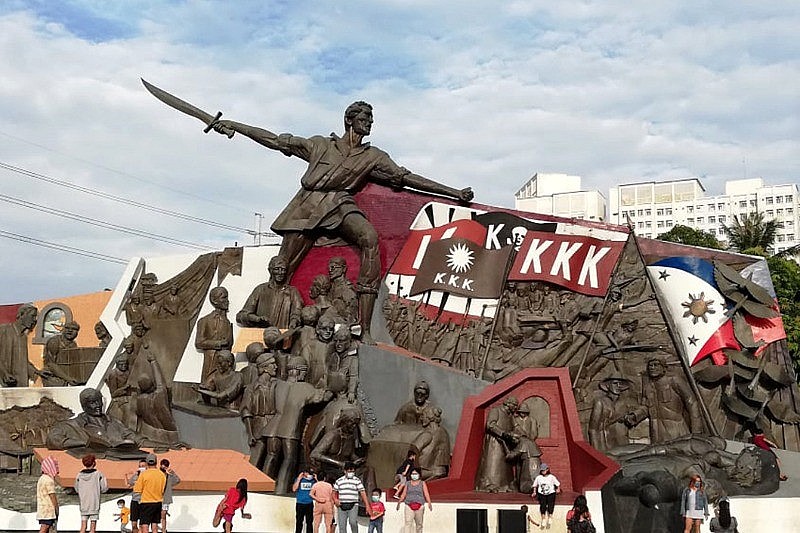 |
| Workers, employers reminded of proper wage on Bonifacio Day holiday |
As a way to honor the birthday of Andrés Bonifacio, one of the Philippines' greatest heroes, Bonifacio Day is a national holiday held every November 30.
The Holiday Pay Rule says that workers should get their daily basic wage for any regular holiday they don't work.
Bonifacio was born on November 30, 1863, and is known as the "Father of the Philippine Revolution" against Spanish rule. He started a group called the Kapipunan with some other people in 1892. The Katipunan was a secret group of revolutionary Filipinos who led military revolts against the Spanish colonizers.
Some historians say that Bonifacio was the first president of the Philippine Republic because he led the Katipunan armed forces and was president of the revolutionary government. Bonifacio and the Katipunan were able to get a lot of people to join their cause, and they eventually became the most powerful revolutionary group the Spanish had to deal with.
But some people, especially Emilio Aguinaldo, didn't agree with Bonifacio's leadership. After a string of problems with leadership and disagreements within the revolutionary forces, Aguinaldo violently took control and sent Bonifacio to be tried and killed for treason, which was not fair.
Bonifacio Day is held every November 30 or the Monday before that to make the weekend longer. If you compare Bonifacio Day to the day of José Rizal's death, it is celebrated on the day he was born. They did this because Bonifacio wasn't killed by foreign colonizers but by people from his own country.
8 Dec Monday - Feast of the Immaculate Conception Special Non-working Holiday
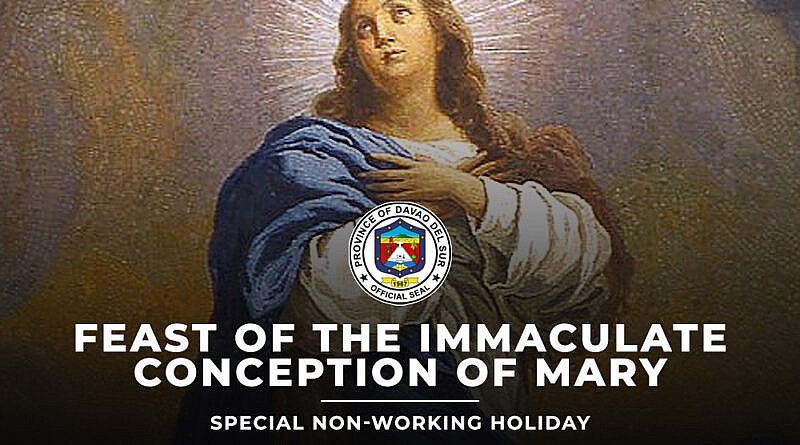 |
| Immaculate Conception Day in Philippines |
Christmas Day always shines a light on any Christian holiday that falls in December. Because of this, some people are surprised by how many countries celebrate this holiday.
Argentina, Austria, Chile, Colombia, Italy, Malta, Portugal, and Spain are just a few of the countries that have public holidays on December 8 to honor the Feast of the Immaculate Conception.
The Feast of the Immaculate Conception is a holiday for everyone. People in general have the day off, and most schools and businesses are closed.
It will be on a Sunday in 2024, so some businesses may decide to keep their Sunday hours.
President Duterte of the Philippines made the Solemnity of the Immaculate Conception on December 8th, 2017, a national holiday in 2017. This was done to honor Filipinos' deep devotion to the Blessed Virgin Mary. Today has become a special day to work.
Panama also has a holiday today in honor of Mother's Day. The Feast of the Immaculate Conception is celebrated as a public holiday. On December 8, Guam also has a public holiday to honor a statue of Mary.
There is a big event in the Philippines on the feast of the Immaculate Conception. Images of the Virgin Mary come from all over the country and are carried around the old walled city in Manila. It's said that these pictures can heal people and make miracles happen, and there are at least 90 of them. Many of them are very fancy. A lot of people call this event "The Grand Marian Procession."
The "carrozas," which are the carriages that carry the statues of Mary, are also very fancy. They are full of flowers and lit candles. The images may also be accompanied by a marching band.
21 Dec Sunday - December Solstice Season
In the Southern Hemisphere, the December solstice is when the Sun is directly above the Tropic of Capricorn. During the year, it gets as far south as this latitude. It starts moving north again after the solstice.
24 Dec Wednesday - Christmas Eve Special Non-working Holiday
Many places around the world celebrate Christmas Eve, which is the day before Christmas Day. The Gregorian calendar puts it on December 24. It is a Christian holiday.
Everyone is off on Christmas Eve. People in general have the day off, and most schools and businesses are closed.
25 Dec Thursday - Christmas Day Regular Holiday
People all over the world celebrate Christmas Day on December 25. It is one of the happiest days for Christians. It honors the birth of Jesus. Christmas Day is a holiday for everyone. People in general have the day off, and most schools and businesses are closed.
30 Dec Tuesday - Rizal Day Regular Holiday
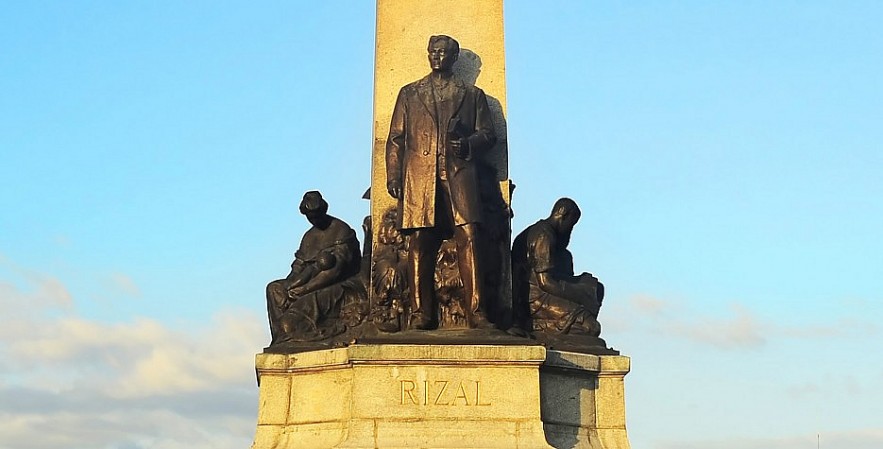 |
| Rizal Day in Philippines |
In the Philippines, this holiday is celebrated every year on December 30th.
José Rizal was put to death on this day in 1896. In the Philippines, this day is known as "Araw ng Kabayanihan ni Dr. Jose Rizal."
A service is held at the Rizal Monument in Manila led by the president to honor the day. All over the country, the Philippine flag is flown at half-mast. There are also ceremonies where wreaths are laid at the Rizal Shrine in Calamba and the Rizal Monument in Baguio City.
Many people have been trying to move this holiday to Rizal's birthday, June 19, in recent years. They think that because it falls so close to Christmas and New Year, it would be more fitting to celebrate his birth than memory of his death.
The day off is a paid workday for most people. For people who have to work on Rizal Day, they should get twice their normal daily wage.
On June 20, 2011, in honor of Rizal's 150th birthday, a special one-time holiday was declared.
31 Dec Wednesday - New Year's Eve Special Non-working Holiday
On December 31, the Gregorian calendar marks the end of the year. New Year's Eve is one of the biggest celebrations in the world because it comes before the New Year. No matter where you are, count down to 2019.
On New Year's Eve, everyone is off. People in general have the day off, and most schools and businesses are closed.
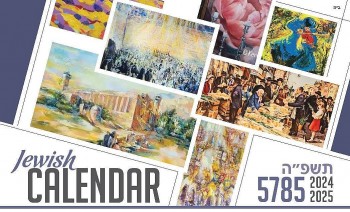 2025 Jewish Calendar: Important Dates, Holidays, Observances and Celebrations 2025 Jewish Calendar: Important Dates, Holidays, Observances and Celebrations Check out the full list of the Jewish holidays in 2025 and the most popular festivals and celebrations. |
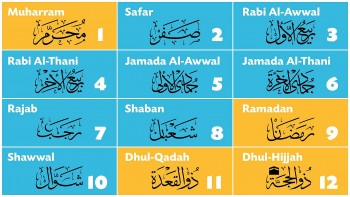 2025 Islamic Calendar: Important Dates, Holidays, Observances and Celebrations 2025 Islamic Calendar: Important Dates, Holidays, Observances and Celebrations Let's explore the full list of the 2025 Islam calendar including observations, religious days, holidays, and popular celebrations. |
 2025 Julian Calendar: Important Dates, Holidays, Observances and Celebrations 2025 Julian Calendar: Important Dates, Holidays, Observances and Celebrations The Julian calendar is a solar calendar introduced by Julius Caesar in 45 BCE, aiming to align the calendar year with the solar year. Here’s ... |
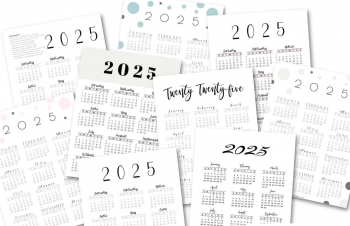 2025 Gregorian Calendar: Important Dates, Holidays, Observances and Celebrations 2025 Gregorian Calendar: Important Dates, Holidays, Observances and Celebrations As we step into 2025, it's essential to mark our calendars with key dates, holidays, and observances that shape our year. This guide will help ... |

